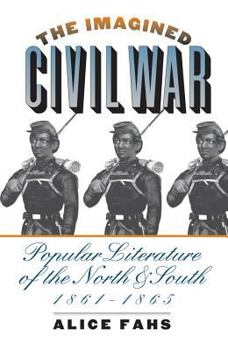The Imagined Civil War: Popular Literature of the North and South, 1861-1865
(Part of the Civil War America Series and Civil War America Series)
Select Format
Select Condition 
Book Overview
In this groundbreaking work of cultural history, Alice Fahs explores a little-known and fascinating side of the Civil War--the outpouring of popular literature inspired by the conflict. From 1861 to 1865, authors and publishers in both the North and the South produced a remarkable variety of war-related compositions, including poems, songs, children's stories, romances, novels, histories, and even humorous pieces. Fahs mines these rich but long-neglected resources to recover the diversity of the war's political and social meanings. Instead of narrowly portraying the Civil War as a clash between two great, white armies, popular literature offered a wide range of representations of the conflict and helped shape new modes of imagining the relationships of diverse individuals to the nation. Works that explored the war's devastating impact on white women's lives, for example, proclaimed the importance of their experiences on the home front, while popular writings that celebrated black manhood and heroism in the wake of emancipation helped readers begin to envision new roles for blacks in American life. Recovering a lost world of popular literature, The Imagined Civil War adds immeasurably to our understanding of American life and letters at a pivotal point in our history.
Format:Hardcover
Language:English
ISBN:0807825816
ISBN13:9780807825815
Release Date:January 2001
Publisher:University of North Carolina Press
Length:424 Pages
Weight:1.80 lbs.
Dimensions:0.1" x 6.1" x 9.3"
Customer Reviews
1 rating
The first comprehensive look at C.W. literature
Published by Thriftbooks.com User , 18 years ago
This book brings out the significance of popular culture during war. Aside from the soldiers who fought in both armies, and the politicians who attempted to build their respective nations, the true meaning of the Civil War came from those on the home front. It was these "citizens," of both the North and South, who through war-related literature such as books, newspapers, poems, magazines, and pamphlets, challenged the ideological pose of war. This "imagined war" was meant to bring inspiration or to put events or certain characters into context. Fahs focuses primarily on the contributions from female writers who composed numerous short stories, poetry, music, letters, and novels in the war. Literature from men is not excluded as the author brings in the influences of Walt Whitman, Oliver Wendell Holmes, and others who contributed mightily to the written aspects of the war. Few military and political materials are presented in this work, and the author generally excludes much of the religious substance found in antebellum literature. Though Fahs incorporates several avenues of African American writings, no publications devoted to emancipation are included in this book. The depictions of blacks during the war's first two years in the widely known Harpers Weekly and Frank Leslie's was meant as humor but portrayed as degrading. However, after Lincoln's Emancipation these images gave way to illustrations of black manhood and heroism, a point made clear in The Imagined Civil War as "tentative and halting."(13) It emphasized that even though this war represented "black freedom," blacks were still seen as the lesser race, and this further exemplifies the constant changes of the popular images of African Americans. Southern literature remained committed to portraying blacks as satisfied with slavery. This would turn later from a role of subordination to a celebration of Southern heritage that was clearly fictional from the beginning. Not surprisingly, Fahs fails to incorporate much literature written by blacks (especially from females), as not much material was printed during the war. As seen Margaret Creighton's Colors of Courage, remembrance of the soldiers who fought and died for "black freedom" took preference over these people of color in the memory of the war. Another recurring theme presented is the importance of gender in Civil War literature. Interestingly enough, northern depictions of a mother's emotional sacrifice as the same as men's heroism gave rise to women as "active heroines"-though gender differences still existed. Fahs does illustrate the South as less willing to incorporate women into its literature, because most there failed to see women outside of the home. These portrayals further demonstrate that during wartime women were generally perceived in a different light, but would soon fall back into their domesticated settings once the men returned home. Also, the changing face of nationalism in Civil War publicat






